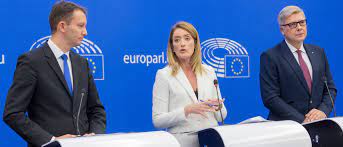EU budget negotiations raise concerns of potential cuts to Horizon Europe

Brussels: There are indications that government finances are constricting, and enthusiasm for cross-European research support is diminishing.
Concerns arise for the future of the research budget as Germany appears poised to reject the European Commission’s proposal to inject an additional €100 billion into the EU’s seven-year budget.
Currently under negotiation as part of the mid-term review of the multi-annual financial framework by EU member states, this augmentation includes €10 billion earmarked for a new strategic technology program, the Strategic Technologies for Europe Platform (STEP).
STEP aims to channel additional funds into various EU technology investment initiatives, including €2.6 billion for the Horizon Europe start-up fund and the European Innovation Council. However, prospects for this funding increase seem bleak, as Germany, a key EU player, seems inclined to prioritise financial support solely for Ukraine, constituting half of the proposed €100 billion.
The absence of support from the largest contributor to the EU budget jeopardises the fate of the STEP program. This move signals a tightening of government finances within the EU, raising concerns about the future funding for research and innovation.
At a time when the research community and the European Parliament advocate for a doubling of current spending, conflicting priorities emerge. While researchers seek additional funding, some governments are pushing for reductions in research spending. In September negotiations, one member state proposed a 4% cut across all EU budget lines, including a €7 billion reduction in the Horizon Europe research program.
This proposal faced strong opposition from other governments. By the end of September, the same member state revised its proposal to exclude cuts to all budget lines except Horizon Europe. While there is evident support for research, national governments are reportedly considering the possibility of smaller cuts to the €95.5 billion research program.
Germany, however, appears resolute. Recently, a constitutional court decision mandated a freeze on further payments from a €60 billion clean energy and industrial transformation fund, citing illegal allocation of funds. This freeze is a response to a constitutionally mandated ‘debt brake,’ restricting the federal deficit to 0.35 per cent of GDP, leading the government to suspend all spending.
The looming question revolves around whether the financial challenges within the EU, coupled with tightened budgets, will erode the bloc’s commitment to investing in research and innovation precisely when substantial funding is crucial for its green and digital transitions.
The recent German court ruling presents a potential long-term complication that could jeopardise the country’s future spending plans, including contributions to the EU budget, by restricting government spending beyond tax receipts. In search of a solution, the government is exploring options, and one drastic measure could involve declaring an emergency to override the debt brake.
Despite the increasingly critical situation, MEP Christian Ehler, the Parliament’s rapporteur for STEP, is refraining from conclusions. Member states cannot make final decisions on the budget without the Parliament’s approval, and historically, the Parliament tends to defend EU spending from cuts.
Reinhilde Veugelers, an economics professor at KU Leuven and senior fellow at the Bruegel think tank, suggests that the budget discussion indicates an increasing inclination among member states to allocate funds to their industries rather than investing in EU-level development and innovation.
In the realm of traditional research, as predominantly supported by Horizon Europe, the significance of collaborative projects remains well-established, according to Veugelers.
This distinction becomes less clear as EU-level support leans toward applied research closer to the market and at higher technology readiness levels (TRLs). Horizon Europe is increasingly allocating funds to projects at higher TRLs, as they are perceived as more politically appealing.
The heads of state are scheduled to convene in Brussels on December 14-15 to attempt to facilitate a mid-term review deal. Following this, the Council will negotiate with the Parliament before reaching a conclusive agreement.





